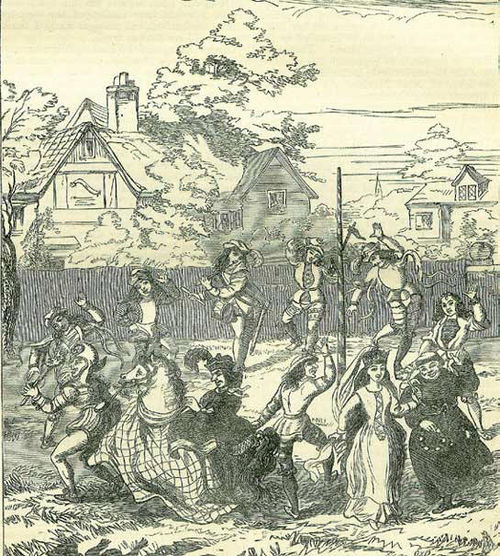Annotation:Morisco: Difference between revisions
No edit summary |
m (Text replacement - "garamond, serif" to "sans-serif") |
||
| (2 intermediate revisions by one other user not shown) | |||
| Line 1: | Line 1: | ||
=='''Back to [[{{BASEPAGENAME}}]]'''== | =='''Back to [[{{BASEPAGENAME}}]]'''== | ||
---- | ---- | ||
<p><font face=" | <p><font face="sans-serif" size="4"> | ||
'''MORISCO'''. AKA - "La Morisque." AKA and see "[[Mouresque (La)]]." English, Country Dance Tune (2/2 time). G Mixolydian. Standard tuning (fiddle). AABBCCDD. The melody was first published by Thoinot Arbeau (1520-1595) in his Orchesographie (1589). "La Morisque" or Morisco is the French term for what is known as the morris dance or ''Moresc'' in England, also called the ''Moresca'' in Corsica. Thus the title "Morisco" is simply a generic title for any vehicle for morris dancing. | '''MORISCO'''. AKA - "La Morisque." AKA and see "[[Mouresque (La)]]." English, Country Dance Tune (2/2 time). G Mixolydian. Standard tuning (fiddle). AABBCCDD. The melody was first published by Thoinot Arbeau (1520-1595) in his '''Orchesographie''' (1589). "La Morisque" or Morisco is the French term for what is known as the morris dance or ''Moresc'' in England, also called the ''Moresca'' in Corsica. Thus the title "Morisco" is simply a generic title for any vehicle for morris dancing. | ||
[[File:morris_dancers.jpg| | [[File:morris_dancers.jpg|500px|thumb|left|Morris dancers, from Chambers Book of Days]] | ||
Seventeenth century London music publisher John Playford, for example, printed different "Moriscos" in various editions of his '''Apollo's Banquet''' and '''Dancing Master.''' Dance revivalist Cecil J. Sharp thought the morris dance was likely Moorish in origin, probably from Morocco; the name 'morris' being a derivative (for more information see Sharp & MacIlwaine's '''The Morris Book''', London, Novello and Company, 1907). | Seventeenth century London music publisher John Playford, for example, printed different "Moriscos" in various editions of his '''Apollo's Banquet''' and '''Dancing Master.''' Dance revivalist Cecil J. Sharp thought the morris dance was likely Moorish in origin, probably from Morocco; the name 'morris' being a derivative (for more information see Sharp & MacIlwaine's '''The Morris Book''', London, Novello and Company, 1907). A "La Mourisqe" is Dance No. 5 in Flemish composer Tylman Susate's (c. 1510/15 to after 1570) '''Het derde musyck boexken...alderhande danserye''' (1551), set for an eight-part ensemble (treble, tenor and bass recorders, tenor and bass viols). It also can be found in the '''Fitzwilliam Virginal Book''' (c. 1615) and Jehan Tabouret's (1520-95) '''Orchesograhie''' (late 16th century). | ||
<br> | <br> | ||
<br> | <br> | ||
</font></p> | </font></p> | ||
<p><font face=" | <p><font face="sans-serif" size="4"> | ||
''Source for notated version'': | ''Source for notated version'': | ||
<br> | <br> | ||
<br> | <br> | ||
</font></p> | </font></p> | ||
<p><font face=" | <p><font face="sans-serif" size="4"> | ||
''Printed sources'': Barnes ('''English Country Dance Tunes, vol. 2'''), 2005; p. 2 (appears under the title "Albany Assembly," the name of a modern dance set to the tune). Raven ('''English Country Dance Tunes'''), 1984; p. 9. | ''Printed sources'': Barnes ('''English Country Dance Tunes, vol. 2'''), 2005; p. 2 (appears under the title "Albany Assembly," the name of a modern dance set to the tune). Raven ('''English Country Dance Tunes'''), 1984; p. 9. | ||
<br> | <br> | ||
<br> | <br> | ||
</font></p> | </font></p> | ||
<p><font face=" | <p><font face="sans-serif" size="4"> | ||
''Recorded sources'': <font color=teal></font> | ''Recorded sources'': <font color=teal></font> | ||
</font></p> | </font></p> | ||
Latest revision as of 14:25, 6 May 2019
Back to Morisco
MORISCO. AKA - "La Morisque." AKA and see "Mouresque (La)." English, Country Dance Tune (2/2 time). G Mixolydian. Standard tuning (fiddle). AABBCCDD. The melody was first published by Thoinot Arbeau (1520-1595) in his Orchesographie (1589). "La Morisque" or Morisco is the French term for what is known as the morris dance or Moresc in England, also called the Moresca in Corsica. Thus the title "Morisco" is simply a generic title for any vehicle for morris dancing.

Seventeenth century London music publisher John Playford, for example, printed different "Moriscos" in various editions of his Apollo's Banquet and Dancing Master. Dance revivalist Cecil J. Sharp thought the morris dance was likely Moorish in origin, probably from Morocco; the name 'morris' being a derivative (for more information see Sharp & MacIlwaine's The Morris Book, London, Novello and Company, 1907). A "La Mourisqe" is Dance No. 5 in Flemish composer Tylman Susate's (c. 1510/15 to after 1570) Het derde musyck boexken...alderhande danserye (1551), set for an eight-part ensemble (treble, tenor and bass recorders, tenor and bass viols). It also can be found in the Fitzwilliam Virginal Book (c. 1615) and Jehan Tabouret's (1520-95) Orchesograhie (late 16th century).
Source for notated version:
Printed sources: Barnes (English Country Dance Tunes, vol. 2), 2005; p. 2 (appears under the title "Albany Assembly," the name of a modern dance set to the tune). Raven (English Country Dance Tunes), 1984; p. 9.
Recorded sources:
